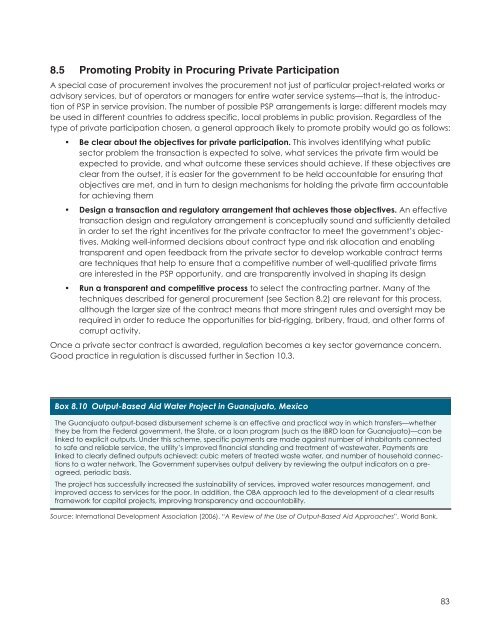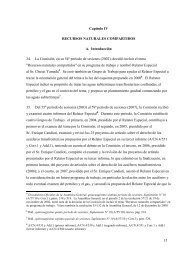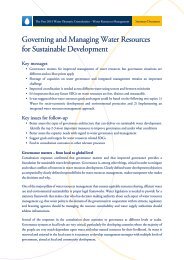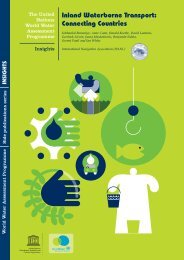A Sourcebook - UN-Water
A Sourcebook - UN-Water
A Sourcebook - UN-Water
You also want an ePaper? Increase the reach of your titles
YUMPU automatically turns print PDFs into web optimized ePapers that Google loves.
8.5 Promoting Probity in Procuring Private Participation<br />
A special case of procurement involves the procurement not just of particular project-related works or<br />
advisory services, but of operators or managers for entire water service systems—that is, the introduction<br />
of PSP in service provision. The number of possible PSP arrangements is large: different models may<br />
be used in different countries to address specific, local problems in public provision. Regardless of the<br />
type of private participation chosen, a general approach likely to promote probity would go as follows:<br />
• Be clear about the objectives for private participation. This involves identifying what public<br />
sector problem the transaction is expected to solve, what services the private firm would be<br />
expected to provide, and what outcome these services should achieve. If these objectives are<br />
clear from the outset, it is easier for the government to be held accountable for ensuring that<br />
objectives are met, and in turn to design mechanisms for holding the private firm accountable<br />
for achieving them<br />
• Design a transaction and regulatory arrangement that achieves those objectives. An effective<br />
transaction design and regulatory arrangement is conceptually sound and sufficiently detailed<br />
in order to set the right incentives for the private contractor to meet the government’s objectives.<br />
Making well-informed decisions about contract type and risk allocation and enabling<br />
transparent and open feedback from the private sector to develop workable contract terms<br />
are techniques that help to ensure that a competitive number of well-qualified private firms<br />
are interested in the PSP opportunity, and are transparently involved in shaping its design<br />
• R un a transparent and competitive process to select the contracting partner. Many of the<br />
techniques described for general procurement (see Section 8.2) are relevant for this process,<br />
although the larger size of the contract means that more stringent rules and oversight may be<br />
required in order to reduce the opportunities for bid-rigging, bribery, fraud, and other forms of<br />
corrupt activity.<br />
Once a private sector contract is awarded, regulation becomes a key sector governance concern.<br />
Good practice in regulation is discussed further in Section 10.3.<br />
Box 8.10 Output-Based Aid <strong>Water</strong> Project in Guanajuato, Mexico<br />
The Guanajuato output-based disbursement scheme is an effective and practical way in which transfers—whether<br />
they be from the Federal government, the State, or a loan program (such as the IBRD loan for Guanajuato)—can be<br />
linked to explicit outputs. Under this scheme, specific payments are made against number of inhabitants connected<br />
to safe and reliable service, the utility’s improved financial standing and treatment of wastewater. Payments are<br />
linked to clearly defined outputs achieved: cubic meters of treated waste water, and number of household connections<br />
to a water network. The Government supervises output delivery by reviewing the output indicators on a preagreed,<br />
periodic basis.<br />
The project has successfully increased the sustainability of services, improved water resources management, and<br />
improved access to services for the poor. In addition, the OBA approach led to the development of a clear results<br />
framework for capital projects, improving transparency and accountability.<br />
Source: International Development Association (2006). “A Review of the Use of Output-Based Aid Approaches”. World Bank.<br />
83
















